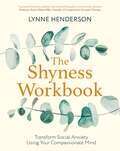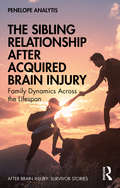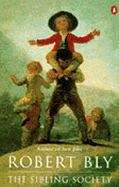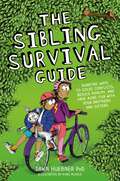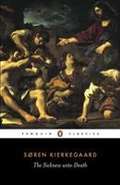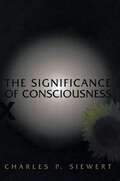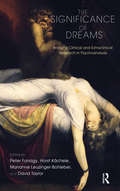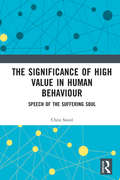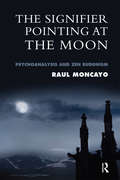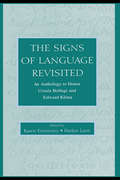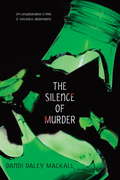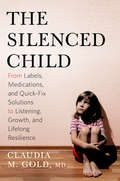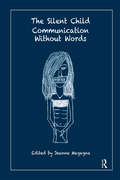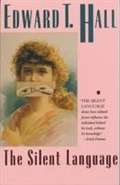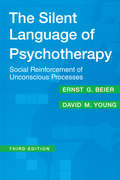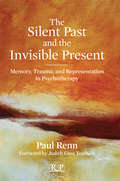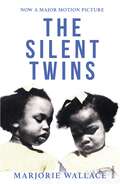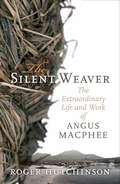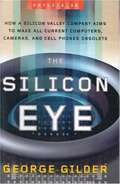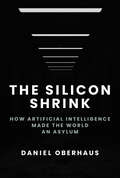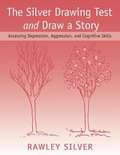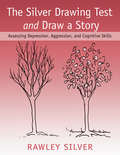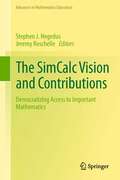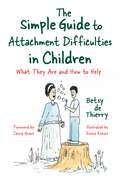- Table View
- List View
The Shyness Workbook: Take Control of Social Anxiety Using Your Compassionate Mind
by Lynne HendersonThere is nothing wrong with being shy - it is a natural emotion that everyone can experience. But if shyness is negatively impacting your life, The Shyness Workbook can help you grow your confidence.Shyness has evolved as an emotion over thousands of years and can be helpful in some circumstances. However, it can become a problem when it interferes with life goals, develops into social anxiety disorder or leads to 'learned pessimism', mild depression and even 'learned helplessness'. In this way, shyness and shame often hold us back from realising our potential and from engaging with others wholeheartedly.This practical self-help workbook sets out the background to shyness - its evolutionary functions and why it becomes chronic in some people - and teaches skills and exercises to help you overcome problematic shyness.Using this workbook, readers will learn how to:· Cope with shy feelings and debunk anxious thoughts· Develop self-compassion· Practise new, confident behavioursFull of fresh insights and exercises, The Shyness Workbook will support your journey into developing social self-confidence.THE COMPASSIONATE MIND APPROACHThe self-help books in this series are based on the Compassionate Mind Approach (developed by series editor Paul Gilbert). This brings together an understanding of how our mind can cause us difficulties but also provides us with a powerful solution in the shape of mindfulness and compassion. It teaches ways to stimulate the part of the brain connected with kindness, warmth, compassion and safeness, and to calm the part that makes us feel anxious, angry, sad or depressed.
The Shyness Workbook: Take Control of Social Anxiety Using Your Compassionate Mind (Compassion Focused Therapy)
by Lynne HendersonThere is nothing wrong with being shy - it is a natural emotion that everyone can experience. But if shyness is negatively impacting your life, The Shyness Workbook can help you grow your confidence.Shyness has evolved as an emotion over thousands of years and can be helpful in some circumstances. However, it can become a problem when it interferes with life goals, develops into social anxiety disorder or leads to 'learned pessimism', mild depression and even 'learned helplessness'. In this way, shyness and shame often hold us back from realising our potential and from engaging with others wholeheartedly.This practical self-help workbook sets out the background to shyness - its evolutionary functions and why it becomes chronic in some people - and teaches skills and exercises to help you overcome problematic shyness.Using this workbook, readers will learn how to:· Cope with shy feelings and debunk anxious thoughts· Develop self-compassion· Practise new, confident behavioursFull of fresh insights and exercises, The Shyness Workbook will support your journey into developing social self-confidence.THE COMPASSIONATE MIND APPROACHThe self-help books in this series are based on the Compassionate Mind Approach (developed by series editor Paul Gilbert). This brings together an understanding of how our mind can cause us difficulties but also provides us with a powerful solution in the shape of mindfulness and compassion. It teaches ways to stimulate the part of the brain connected with kindness, warmth, compassion and safeness, and to calm the part that makes us feel anxious, angry, sad or depressed.
The Sibling Relationship After Acquired Brain Injury: Family Dynamics Across the Lifespan (After Brain Injury: Survivor Stories)
by Penelope AnalytisThis important book gives a voice to the lived experience of siblings and family members when one sibling has an acquired brain injury (ABI). ABI is associated with a range of physical, cognitive, behavioural and personality changes, many of which will be lifelong. Penelope Analytis examines how this condition affects the sibling relationship. Although siblings play an important role in our sense of identity, development and wellbeing, this relationship has been largely overlooked in the context of rehabilitation. Combining research with stories of siblings’ experiences of life after ABI, this book explores how siblings seek to continue their relationship across the lifespan and make sense of the impact of ABI. It looks at the concept of "post-traumatic growth" within the context of ABI and explores siblings’ perceptions of growth after ABI, including shaping their life priorities, family relationships and values. It includes the perspectives of siblings themselves who have an ABI, recognising them as active members of this unique relationship, and of siblings of people with an ABI. This is valuable reading for siblings and families impacted by ABI and professionals working with them who would like to better understand how to support siblings, as well as students in neuropsychology and related fields.
The Sibling Society: An Impassioned Call for the Rediscovery of Adulthood
by Robert BlyWhere have all the grownups gone? In answering that question with the same freewheeling erudition and intuitive brilliance that made Iron John a national bestseller, poet, storyteller and translator Robert Bly tells us that we live in a "sibling society, " in which adults have regressed into adolescence and adolescents refuse to grow up.
The Sibling Survival Guide: Surefire Ways to Solve Conflicts, Reduce Rivalry, and Have More Fun with your Brothers and Sisters
by Dawn HuebnerHaving a brother or sister can be tough. It can also be great, but it's hard to see the great parts with so many bad parts getting in the way. Problems like fighting and bossing. Teasing and jealousy. Tattling. Pestering. And more.But what if you could do something about those problems? Clear them away? Then you'd be able to actually enjoy your siblings!This indispensable guide from best-selling author Dr. Dawn Huebner speaks directly to children ages 9-12, teaching skills to help them manage feelings and resolve conflicts, strengthening the bonds between brothers and sisters.Warm, witty, and packed with practical strategies, this interactive book is the complete resource for educating, motivating, and empowering siblings to live in peace.
The Sickness Unto Death: A Christian Psychological Exposition for Edification and Awakening by AntiI-Climacus,
by KierkegaardKierkegaard explores the concept of "despair," alerting readers to the diversity of ways in which they may be described as living in this state of bleak abandonment—including some that may seem just the opposite—and offering a much-discussed formula for the eradication of despair.
The Significance of Consciousness
by Charles SiewertCharles Siewert presents a distinctive approach to consciousness that emphasizes our first-person knowledge of experience and argues that we should grant consciousness, understood in this way, a central place in our conception of mind and intentionality. Written in an engaging manner that makes its recently controversial topic accessible to the thoughtful general reader, this book challenges theories that equate consciousness with a functional role or with the mere availability of sensory information to cognitive capacities. Siewert argues that the notion of phenomenal consciousness, slighted in some recent theories, can be made evident by noting our reliance on first-person knowledge and by considering, from the subject's point of view, the difference between having and lacking certain kinds of experience. This contrast is clarified by careful attention to cases, both actual and hypothetical, indicated by research on brain-damaged patients' ability to discriminate visually without conscious visual experience--what has become known as "blindsight." In addition, Siewert convincingly defends such approaches against objections that they make an illegitimate appeal to "introspection." Experiences that are conscious in Siewert's sense differ from each other in ways that only what is conscious can--in phenomenal character--and having this character gives them intentionality. In Siewert's view, consciousness is involved not only in the intentionality of sense experience and imagery, but in that of nonimagistic ways of thinking as well. Consciousness is pervasively bound up with intelligent perception and conceptual thought: it is not mere sensation or "raw feel." Having thus understood consciousness, we can better recognize how, for many of us, it possesses such deep intrinsic value that life without it would be little or no better than death.
The Significance of Dreams: Bridging Clinical and Extraclinical Research in Psychoanalysis (Developments In Psychoanalysis Ser.)
by Peter FonagyThis book looks at dreams from a twenty-first century perspective. It takes its inspiration from Freud's insights, but pursues psychoanalytic interest into both neuroscience and the modern psychoanalytic consulting room. The book looks at laboratory research on dreaming alongside the modern clinical use of dreams and links together clinical and empirical research, integrating classical ideas with the plurality of psychoanalytic theoretical constructs available to modern researchers. Psychoanalysts writing about dreams have traditionally represented the cutting edge of clinical and theoretical development, and this book is no exception. Many of the contributions, as well as the epistemological position taken by the writers, represent a kind of radical openness to new ways of thinking about the clinical situation and about theory. In line with the ambition of the editors, this volume represents an integration of theories and disciplines, and a scientific context for modern psychoanalysis. The link between clinical research and extraclinical research via the royal road of dreaming is a theme that runs through all the contributions.
The Significance of High Value in Human Behaviour: Speech of the Suffering Soul
by Chris SteedThe Significance of High Value in Human Behaviour is an innovative conceptualisation of how the quest for a high self-worth works as a psychosocial dynamic, presenting the idea that feelings of impotence and low self-esteem induce a powerful impetus on negative human action. This book gives an account of what it means to base a whole psychological perspective on high value, which has been an understudied aspect of human action. Employing an ethnographical approach, the book uses client observations and social research to promote original solutions in an empathetic and engaging manner for psychological support services aiding isolated individuals. It considers the concept of a valuable self and examines the negative effects within the personality which can be generated when this drive for a valuable self is blocked through human devaluation or violence. The Significance of High Value in Human Behaviour will appeal to academics and post-graduate students in the fields of psychology and psychotherapy, psychotherapists with specialist interests in loneliness and self-worth, and sociologists concerned with the psychology of the self.
The Signifier Pointing at the Moon: Psychoanalysis and Zen Buddhism
by Raul MoncayoWithin the context of a careful review of the psychology of religion and prior non-Lacanian literature on the subject, Raul Moncayo builds a bridge between Lacanian psychoanalysis and Zen Buddhism that steers clear of reducing one to the other or creating a simplistic synthesis between the two. Instead, by making a purposeful "One-mistake" of "unknown knowing", this book remains consistent with the analytic unconscious and continues in the splendid tradition of Bodhidharma who did not know "Who" he was and told Emperor Wu that there was no merit in building temples for Buddhism. Both traditions converge on the teaching that "true subject is no ego", or on the realisation that a new subject requires the symbolic death or deconstruction of imaginary ego-identifications. Although Lacanian psychoanalysis is known for its focus on language and Zen is considered a form of transmission outside the scriptures, Zen is not without words while Lacanian psychoanalysis stresses the senseless letter of the Real or of a jouissance written on and with the body.
The Signs of Language Revisited: An Anthology To Honor Ursula Bellugi and Edward Klima
by Harlan Lane Karen EmmoreyThe burgeoning of research on signed language during the last two decades has had a major influence on several disciplines concerned with mind and language, including linguistics, neuroscience, cognitive psychology, child language acquisition, sociolinguistics, bilingualism, and deaf education. The genealogy of this research can be traced to a remarkable degree to a single pair of scholars, Ursula Bellugi and Edward Klima, who have conducted their research on signed language and educated scores of scholars in the field since the early 1970s. The Signs of Language Revisited has three major objectives: * presenting the latest findings and theories of leading scientists in numerous specialties from language acquisition in children to literacy and deaf people; * taking stock of the distance scholarship has come in a given field, where we are now, and where we should be headed; and * acknowledging and articulating the intellectual debt of the authors to Bellugi and Klima--in some cases through personal reminiscences. Thus, this book is also a document in the sociology and history of science.
The Silence of Murder
by Dandi Daley MackallSeventeen-year-old Hope Long's life revolves around her brother Jeremy. So when Jeremy is accused of killing the town's beloved baseball coach, Hope's world begins to unravel. Everyone is convinced Jeremy did it, and since he hasn't spoken a word in 9 years, he's unable to defend himself. Their lawyer instructs Hope to convince the jury that Jeremy is insane, but all her life Hope has known that Jeremy's just different than other people--better, even. As she works to prove his innocence--joined by her best friend T.J. and the sheriff's son, Chase--Hope uncovers secrets about the murder, the townspeople, her family, and herself. She knows her brother isn't the murderer. But as she comes closer to the truth, she's terrified to find out who is.From the Hardcover edition.
The Silenced Child: From Labels, Medications, and Quick-Fix Solutions to Listening, Growth, and Lifelong Resilience (A Merloyd Lawrence Book)
by Claudia M. GoldAre children and adolescents being silenced and their growth stunted in the age of quick diagnoses and overmedication? In The Silenced Child, Dr. Claudia Gold shows the tremendous power of listening in parent/child and doctor/patient relationships. Through vivid stories, perceptive insights, and new research, she shows the way children grow from these relationships and how being heard actually changes their brains. She helps both parents and caregivers make the time and space for listening.Praise for Keeping Your Child in Mind:"A very useful, thoughtful book. It lays out the best thinking of our time to help parents make decisions about nurturing their child's development."-T. Berry Brazelton, MD, professor of Pediatrics, Emeritus Harvard Medical School
The Silent Child: Communication without Words
by Jeanne MagagnaThis book arose out of the need to work with emotionally regressed non-talking children who entered hospital in full retreat from the external world. It helps parents and professionals compassionately comprehend the child's difficulties in depending on someone to receive communication.
The Silent Language
by Edward T. HallIn the everyday, but unspoken give-and-take of human relationships, the "silent language" plays a vitally important role. Here, a leading American anthropologist has analyzed the many ways in which people "talk" to one another without the use of words. The pecking order in a chicken yard, the fierce competition in a school playground, every unwitting gesture and action--this is the vocabulary of the "silent language. " According to Dr. Hall, the concepts of space and time are tools with which all human beings may transmit messages. Space, for example, is the outgrowth of an animal's instinctive defense of his lair and is reflected in human society by the office worker's jealous defense of his desk, or the guarded, walled patio of a Latin-American home. Similarly, the concept of time, varying from Western precision to Easter vagueness, is revealed by the businessman who pointedly keeps a client waiting, or the South Pacific islander who murders his neighbor for an injustice suffered twenty years ago. THE SILENT LANGUAGE shows how cultural factors influence the individual behind his back, wihtout his knowledge.
The Silent Language of Psychotherapy: Social Reinforcement of Unconscious Processes
by David M. YoungTherapeutic changes occur in many places, and among animals as well as humans. A theory that attempts to explain therapeutic changes should be based on principles that apply not only to those changes occurring during the hour, but also to those observed in the educational process, in interpersonal relations, and in the social milieu, as well as with animals. It would be desirable to discover principles broad enough to provide a deeper understanding of therapeutic change in this wide variety of situations.Experienced therapists appear to be similar in what they are doing, although they may disagree as to why they do it. In spite of the arguments about theoretical formulations, it can be observed that during an hour with a patient many psychotherapists may not follow their own theories too well. There probably is some relevance in a comparison of psychotherapy with a concept formation test: the subject gives the correct answers but is unable to state why he did so or what principles he followed in making his choices. The therapist, too, may help a patient but he is often uncertain as to "why" and "how." It is very likely that the effective principles in therapeutic work rest on processes that are more general than the specific principles advanced by different schools.This volume combines the elements of psychodynamic and cognitive behavioral therapy in a theoretical system that focuses on the importance of patient-therapist interaction, especially in terms of the exchange of subtle or covert communication cues. In this significantly updated and expanded edition of their classic text, Beier and Young analyze recent developments in new areas of practice facing today's therapist: managed care and the clinical impact of the control of healthcare delivery; and biological intervention and other issues related to psychotropic medication.
The Silent Past and the Invisible Present: Memory, Trauma, and Representation in Psychotherapy (Relational Perspectives Book Series)
by Paul RennDrawing on research in the fields of cognitive and developmental psychology, attachment, trauma, and neuroscience, as well as 20 years in forensic and private practice, Paul Renn deftly illustrates the ways in which this research may be used to inform an integrated empirical/hermeneutic model of clinical practice. He suggests that silent, invisible processes derived from the past maintain non-optimal ways of experiencing and relating in the present, and that a neuroscience understanding of the dynamic nature of memories, and of the way in which the implicit and explicit memory systems operate and interact, is salient to a concomitant understanding of trauma, personality development, and therapeutic action. Specifically, Renn argues that an intersubjective psychodynamic model can use the power of an emotionally meaningful therapeutic relationship to gradually facilitate both relational and neurological changes in patients with trauma histories. Taken as a whole, these themes reflect a paradigmatic shift in psychoanalytic thinking about clinical work and the process of change.
The Silent Twins: Now a major motion picture starring Letitia Wright
by Marjorie WallaceThe astounding true story behind the major new motion picture starring Letitia Wright and Tamara Lawrance, with a new epilogue from the author'A compelling and tragic story' Mail on Sunday When identical twins, June and Jennifer Gibbons were three they began to reject communication with anyone but each other, and so began a childhood bound together in a strange and secret world. As they grew up, love and hate united to push them to the extreme margins of society and, following a five week spree of vandalism and arson, the silent twins were sentenced to a gruelling twelve-year detention in Broadmoor.Award-winning investigative journalist Marjorie Wallace delves into the twins' silent world, revealing their genius, alienation and the mystic bond by which the extremes of good and evil ended in possession and death.'Breathtaking' Independent 'Extraordinary' Oliver Sacks, New York Times Review of Books
The Silent Weaver: The Extraordinary Life and Work of Angus MacPhee
by Roger HutchinsonA &“fascinating, poignant&” biography of the WWII veteran who, while confined to an asylum, became one of the great outsider artists of modern times (The Scotsman). In September 1939, groups of horsemen in battledress cantered down a broad, grassy plain on the western edge of Europe. The young men of the Western Isles of Scotland were going to war again. They included a tall, shy twenty-four-year-old named Angus MacPhee. Angus returned from war alive but in chronic mental pain, and was referred to the asylum in Inverness, where he spent the next fifty years of his life. During his time at Craig Dunain Hospital, he retreated into his own silent world, and did not speak again until shortly before his death. But &“the quiet big man,&” as he was known, spent his time creating a huge number of objects out of woven grass, sheep&’s wool, and beach leaves—mostly clothes, caps, and hats—which he then let decay or deliberately burned. Only after an art therapist discovered his miraculous creations were some of them preserved for posterity. And only then did Angus MacPhee come home to South Uist, where he died a year later. The Silent Weaver is a rich, moving and enthralling exploration of mental health, the creative process, human frailty, and ancient traditions.
The Silicon Eye: How A Silicon Valley Company Aims to Make All Current Computers, Cameras and Cell Phones Obsolete
by George GilderThe Silicon Eye is a narrative of some of the smartest - and most colorful - people on earth and their race to transform an entire industry.
The Silicon Shrink: How Artificial Intelligence Made the World an Asylum
by Daniel OberhausWhy the race to apply AI in psychiatry is so dangerous, and how to understand the new tech-driven psychiatric paradigm.AI psychiatrists promise to detect mental disorders with superhuman accuracy, provide affordable therapy for those who can’t afford or can’t access treatment, and even invent new psychiatric drugs. But the hype obscures an unnerving reality. In The Silicon Shrink, Daniel Oberhaus tells the inside story of how the quest to use AI in psychiatry has created the conditions to turn the world into an asylum. Most of these systems, he writes, have vanishingly little evidence that they improve patient outcomes, but the risks they pose have less to do with technological shortcomings than the application of deeply flawed psychiatric models of mental disorder at unprecedented scale. Oberhaus became interested in the subject of mental health after tragically losing his sister to suicide. In the book, he argues that these new, ostensibly therapeutic technologies already pose significant risks to vulnerable people, and they won’t stop there. These new breeds of AI systems are creating a psychiatric surveillance economy in which the emotions, behavior, and cognition of everyday people are subtly manipulated by psychologically savvy algorithms that have escaped the clinic. Oberhaus also introduces readers to the concept of “swipe psychology,” which is quickly establishing itself as the dominant mode of diagnosing and treating mental disorders. It is not too late to change course, but to do so means we must reckon with the nature of mental illness, the limits of technology, and what it means to be human.
The Silver Drawing Test & Draw a Story: Assessing Depression, Aggression, and Cognitive Skills
by Rawley SilverIn The Silver Drawing Test and Draw a Story, Rawley Silver draws on her years of experience using therapeutic art with hearing-impaired children, stroke patients, and others with learning disabilities or emotional disturbances.
The Silver Drawing Test and Draw a Story: Assessing Depression, Aggression, and Cognitive Skills
by Rawley SilverArt can be an invaluable means of communication. It can bypass language and impairment and allow for the expression of thoughts or feelings too difficult to communicate with words. In The Silver Drawing Test and Draw a Story, Rawley Silver draws on her years of experience using therapeutic art with hearing-impaired children, stroke patients, and others with learning disabilities or emotional disturbances. The book’s original art assessments use stimulus drawings to elicit responses that provide access to a patient’s emotions and attitudes toward themselves and others, while also testing for the ability to solve problems and convey ideas. Offering tools to assess cognitive skills that often escape detection on verbal tests of intelligence or achievement, the book helps in identifying those at risk for violent behavior or masked depression. Thoroughly updated from Silver’s earlier works, this new book includes techniques to assess aggression and depression that may lead to violence in schools and suicide among children and adolescents. It also addresses important gender and age differences, incorporating new information and updated studies, and it offers an in-depth look at the developmental procedures involved in these art assessments. As education for mental health professionals now includes art therapy more regularly, Silver has provided an invaluable resource for assessing emotional and cognitive content.
The SimCalc Vision and Contributions
by Jeremy Roschelle Stephen J. HegedusThis volume provides essential guidance for transforming mathematics learning in schools through the use of innovative technology, pedagogy, and curriculum. It presents clear, rigorous evidence of the impact technology can have in improving students learning of important yet complex mathematical concepts -- and goes beyond a focus on technology alone to clearly explain how teacher professional development, pedagogy, curriculum, and student participation and identity each play an essential role in transforming mathematics classrooms with technology. Further, evidence of effectiveness is complemented by insightful case studies of how key factors lead to enhancing learning, including the contributions of design research, classroom discourse, and meaningful assessment. The volume organizes over 15 years of sustained research by multiple investigators in different states and countries who together developed an approach called "SimCalc" that radically transforms how Algebra and Calculus are taught. The SimCalc program engages students around simulated motions, such as races on a soccer field, and builds understanding using visual representations such as graphs, and familiar representations such as stories to help students to develop meaning for more abstract mathematical symbols. Further, the SimCalc program leverages classroom wireless networks to increase participation by all students in doing, talking about, and reflecting on mathematics. Unlike many technology programs, SimCalc research shows the benefits of balanced attention to curriculum, pedagogy, teacher professional development, assessment and technology -- and has proven effectiveness results at the scale of hundreds of schools and classrooms. Combining the findings of multiple investigators in one accessible volume reveals the depth and breadth of the research program, and engages readers interested in: * Engaging students in deeply learning the important concepts in mathematics * Designing innovative curriculum, software, and professional development · Effective uses of technology to improve mathematics education * Creating integrated systems of teaching that transform mathematics classrooms * Scaling up new pedagogies to hundreds of schools and classrooms * Conducting research that really matters for the future of mathematics learning * Engaging students in deeply learning the important concepts in mathematics * Designing innovative curriculum, software, and professional development · Effective uses of technology to improve mathematics education * Creating integrated systems of teaching that transform mathematics classrooms * Scaling up new pedagogies to hundreds of schools and classrooms * Conducting research that really matters for the future of mathematics learning
